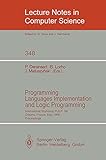Programming Languages Implementation and Logic Programming [electronic resource] : International Workshop PLILP '88 Orléans, France, May 16–18, 1988 Proceedings / edited by P. Deransart, B. Lorho, J. Małuszyński.
Material type: TextSeries: Lecture Notes in Computer Science ; 348Publisher: Berlin, Heidelberg : Springer Berlin Heidelberg, 1989Description: VIII, 308 p. online resourceContent type: text Media type: computer Carrier type: online resourceISBN: 9783540460923Subject(s): Computer science | Logic design | Artificial intelligence | Computer Science | Programming Languages, Compilers, Interpreters | Artificial Intelligence (incl. Robotics) | Logics and Meanings of Programs | Programming TechniquesAdditional physical formats: Printed edition:: No titleDDC classification: 005.13 LOC classification: QA76.7-76.73QA76.76.C65Online resources: Click here to access online
TextSeries: Lecture Notes in Computer Science ; 348Publisher: Berlin, Heidelberg : Springer Berlin Heidelberg, 1989Description: VIII, 308 p. online resourceContent type: text Media type: computer Carrier type: online resourceISBN: 9783540460923Subject(s): Computer science | Logic design | Artificial intelligence | Computer Science | Programming Languages, Compilers, Interpreters | Artificial Intelligence (incl. Robotics) | Logics and Meanings of Programs | Programming TechniquesAdditional physical formats: Printed edition:: No titleDDC classification: 005.13 LOC classification: QA76.7-76.73QA76.76.C65Online resources: Click here to access online  E-BOOKS
E-BOOKS
| Current library | Home library | Call number | Materials specified | URL | Status | Date due | Barcode |
|---|---|---|---|---|---|---|---|
| IMSc Library | IMSc Library | Link to resource | Available | EBK5692 |
Static analysis of functional programs with logical variables -- Towards a clean amalgamation of logic programs with external procedures -- An application of abstract interpretation in source level program transformation -- A tool to check the non-floundering logic programs and goals -- Towards a framework for the abstract interpretation of logic programs -- An implementation of retargetable code generators in prolog -- Towards a "middle road" methodology for writing code generators -- A compiler written in prolog: the véda experience -- Coupled context-free grammar as a programming paradigm -- A bottom-up adaptation of earley's parsing algorithm -- Using an attribute grammar as a logic program -- Structure sharing in attribute grammars -- A semantic evaluator generating system in prolog -- A grammatical view of logic programming -- Compiling typol with attribute grammars -- Formal specification of a prolog compiler -- Formal specification of interactive languages using definite clause grammars -- Using logic databases in software development environments.
The aim of the workshop was to discuss whether research on implementation of programming languages and research on logic programming can mutually benefit from each others results. The intention was to bring together researchers from both fields, especially those working in the area of their intersection. Problems such as formal specification of compilers and syntax-based editors, program analysis and program optimization have been traditionally studied by implementors of algorithmic languages and have resulted in a number of well-established notions, formalisms and techniques. At the same time, an increasing number of people use logic programming as a way of specifying compilers or other programming environment tools, taking advantage of the relatively high level of logic programming and the growing efficiency of Prolog implementations. On the other hand, research on logic programming raises the questions of analysis of logic programs and their optimization. These are motivated primarily by compiler construction for logic programs, by studies on the methodology of logic programming and by the attempts to amalgamate logic programming and functional programming. The purpose of the workshop is to review the techniques developed in one (or both) of the fields which could also be of some help in the other one and to facilitate the transfer of expertise. It seems important to compare notions used in both fields: showing similarities between them may prevent rediscovering results already known, while studying differences may contribute to the transfer of technology.


There are no comments on this title.